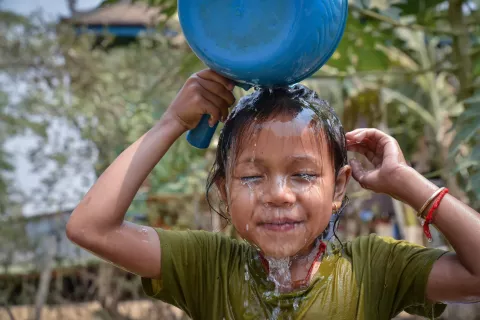International Day of the Girl Child | United Nations (original) (raw)
Girls’ vision for the future
The 2024 International Day of the Girl theme is ‘Girls’ vision for the future’.
This year’s theme conveys both the need for urgent action and persistent hope, driven by the power of girls’ voices and vision for the future.
Today’s generation of girls is disproportionately affected by global crises of climate, conflict, poverty and pushback on hard won gains for human rights and gender equality. Too many girls are still denied their rights, restricting their choices and limiting their futures.
Yet, recent analysis shows that girls are not only courageous in the face of crisis, but hopeful for the future. Every day, they are taking action to realize a vision of a world in which all girls are protected, respected and empowered.
But girls cannot realize this vision alone. They need allies who listen to and respond to their needs.
With the right support, resources and opportunities, the potential of the world’s more than 1.1 billion girls is limitless. And when girls lead, the impact is immediate and wide reaching: families, communities and economies are all stronger, our future brighter.
It is time to listen to girls, to invest in proven solutions that will accelerate progress towards a future in which every girl can fulfil her potential.
Five game-changing solutions with and for adolescent girls
Did you know that investing in girls is not only the right thing to do for them, but it also brings positive impacts to their families, communities, and societies as a whole? Based on the priorities of young people worldwide for promoting adolescent girls' rights, there are five key solutions rooted in partnerships that can transform girls' lives and secure their futures.
Background
In 1995 at the World Conference on Women in Beijing countries unanimously adopted the Beijing Declaration and Platform for Action – the most progressive blueprint ever for advancing the rights of not only women but girls. The Beijing Declaration is the first to specifically call out girls’ rights.
On December 19, 2011, United Nations General Assembly adopted Resolution 66/170 to declare October 11 as the International Day of the Girl Child, to recognize girls’ rights and the unique challenges girls face around the world.
The International Day of the Girl Child focuses attention on the need to address the challenges girls face and to promote girls’ empowerment and the fulfilment of their human rights.
Adolescent girls have the right to a safe, educated, and healthy life, not only during these critical formative years, but also as they mature into women. If effectively supported during the adolescent years, girls have the potential to change the world – both as the empowered girls of today and as tomorrow’s workers, mothers, entrepreneurs, mentors, household heads, and political leaders. An investment in realising the power of adolescent girls upholds their rights today and promises a more equitable and prosperous future, one in which half of humanity is an equal partner in solving the problems of climate change, political conflict, economic growth, disease prevention, and global sustainability.
Girls are breaking boundaries and barriers posed by stereotypes and exclusion, including those directed at children with disabilities and those living in marginalized communities. As entrepreneurs, innovators and initiators of global movements, girls are creating a world that is relevant for them and future generations.
The 2030 Agenda for Sustainable Development and its 17 Sustainable Development Goals (SDGs) adopted by world leaders in 2015, embody a roadmap for progress that is sustainable and leaves no one behind.
Achieving gender equality and women’s empowerment is integral to each of the 17 goals. Only by ensuring the rights of women and girls across all the goals will we get to justice and inclusion, economies that work for all, and sustaining our shared environment now and for future generations.
Vanessa Nakate on how the climate crisis impacts girls
Vanessa Nakate, 25, is a Ugandan climate change activist and founder of the Africa-based Rise Up Movement. Nakate speaks out on the climate crisis and its intersection with gender and race, especially in how it disproportionately affects women and girls in Africa.
